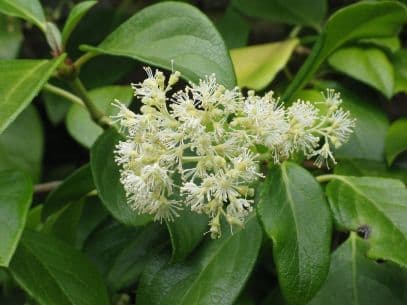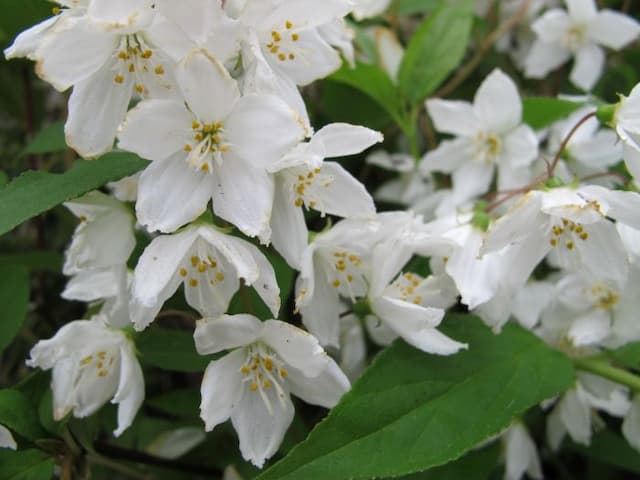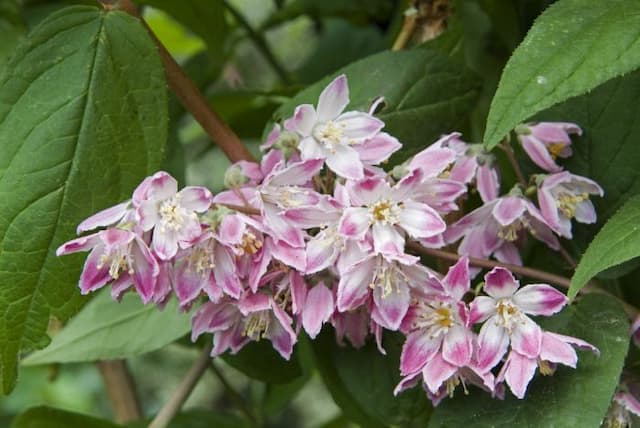Deutzia Deutzia × elegantissima 'Rosealind'

ABOUT
Deutzia × elegantissima 'Rosealind', commonly known as Elegant Deutzia, is a deciduous shrub known for its ornamental features. During the blooming season, Elegant Deutzia boasts a profusion of pink flowers that cover the branches, creating a stunning display. These flowers are star-shaped, commonly found in clusters, and have a gentle, pale pink hue that fades to white toward the edges. The petals are delicate, with a slight overlap, contributing to a frothy, textured appearance that enhances the plant's overall elegance. The foliage of the Elegant Deutzia consists of opposite leaves that are simple in structure with a fine-toothed margin. These leaves are usually a deep green, which provides a lush background for the pink blooms. The leaves may also exhibit subtle color changes as seasons transition, adding to the visual interest of the plant. Elegant Deutzia has a gracefully arching growth habit, with branches that may gently weep, giving it a soft, relaxed stature. The bark on older branches can peel in strips, revealing a diverse range of colors beneath and adding to the plant's year-round appeal. As a cultivated hybrid, 'Rosealind' is appreciated for its charming appearance and is a popular choice for gardeners who wish to add a romantic touch to their landscapes. It is often used as a specimen plant or incorporated into mixed borders, where its floral abundance and attractive foliage can be admired up close.
About this plant
 Names
NamesFamily
Hydrangeaceae
Synonyms
Fuzzy Deutzia, Elegant Deutzia, Slender Deutzia
Common names
Deutzia × elegantissima 'Rosealind'.
 Toxicity
ToxicityTo humans
Deutzia, the most common name for Deutzia × elegantissima 'Rosealind', is generally considered non-toxic to humans. There is no significant evidence to suggest that it contains any toxic compounds that would lead to poisoning if ingested. Consequently, there are no specific symptoms of poisoning associated with this plant for humans. However, it's always prudent to avoid eating ornamental plants as some individuals may experience allergic reactions or gastrointestinal discomfort.
To pets
Deutzia is also generally considered non-toxic to pets. This would mean that ingestion of this plant, Deutzia × elegantissima 'Rosealind', is unlikely to cause serious harm or poisoning in pets like cats and dogs. While the plant is not expected to be poisonous, it's always possible that some pets may have a sensitivity that could lead to mild gastrointestinal upset, including symptoms such as vomiting or diarrhea, if they consume parts of this plant. However, these would not be symptoms of true poisoning, but rather a reaction to eating a non-food plant.
 Characteristics
CharacteristicsLife cycle
Perennials
Foliage type
Deciduous
Color of leaves
Green
Flower color
Pink
Height
4-5 feet (1.2-1.5 meters)
Spread
4-5 feet (1.2-1.5 meters)
Plant type
Shrub
Hardiness zones
5
Native area
Asia
Benefits
 General Benefits
General Benefits- Attractive Flowers: Produces abundant clusters of delicate pink blossoms that add beauty to landscapes.
- Wildlife Attraction: Attracts pollinators such as bees and butterflies, supporting local ecosystems.
- Seasonal Interest: Offers multi-season interest with flowers in spring and foliage that changes color in autumn.
- Low Maintenance: Requires minimal care once established, making it suitable for novice gardeners.
- Compact Size: A moderate growth habit allows it to fit well in smaller gardens or as part of mixed borders.
- Drought Tolerance: Once established, it has a degree of drought tolerance, reducing the need for frequent watering.
- Adaptability: Adapts to a range of soil types, though it prefers well-drained soil.
 Medical Properties
Medical PropertiesThis plant is not used for medical purposes.
 Air-purifying Qualities
Air-purifying QualitiesThis plant is not specifically known for air purifying qualities.
 Other Uses
Other Uses- Deutzia × elegantissima 'Rosealind', commonly known as the Elegant Deutzia, can be used in floral arrangements due to its clusters of pink flowers, adding a delicate touch to bouquets.
- This plant can be trained to grow against a wall or trellis, creating a living piece of art with its charming blooms.
- Elegant Deutzia's stems can be used in winter crafts after leaf drop, providing structure and interest to wreaths and other decorations.
- The plant can serve as an educational tool in horticulture classes, demonstrating pruning techniques for shrubs to promote dense growth and abundant flowering.
- Elegant Deutzia can be incorporated into sensory gardens, where the texture of its leaves and the softness of its flowers can be appreciated by touch.
- The dense growth habit provides cover for small wildlife, like birds and beneficial insects, creating a mini habitat within the garden.
- During autumn, its foliage turns to shades of purple and bronze, making it useful for teaching about seasonal changes in plants.
- Elegant Deutzia can be used in landscape design to create a 'natural fence' that marks boundaries while still being aesthetically pleasing.
- The contrasting green foliage and pink flowers can be used in color therapy gardens, where the visual impact of plant colors is used to enhance emotional well-being.
- Because it thrives in a variety of soil types, Deutzia × elegantissima 'Rosealind' is useful in erosion control on slopes and banks.
Interesting Facts
 Feng Shui
Feng ShuiThe Slender deutzia is not used in Feng Shui practice.
 Zodiac Sign Compitability
Zodiac Sign CompitabilityThe Slender deutzia is not used in astrology practice.
 Plant Symbolism
Plant Symbolism- Innocence: Deutzia flowers are often associated with purity and innocence because of their delicate and unassuming appearance.
- Humility: The small and modest blooms of the Deutzia suggest a sense of humility, symbolizing an unpretentious and down-to-earth attitude.
- Feminine Beauty: With its soft pink flowers, the Deutzia × elegantissima 'Rosealind' can symbolize feminine beauty and grace.
- Renewal: Deutzias typically bloom in the spring, which makes them a symbol of renewal and the rejuvenation that comes with the season.
 Water
WaterThe Deutzia Elegantissima, commonly known as Elegant Deutzia, should be watered regularly to keep the soil consistently moist but not waterlogged. During the active growing season in spring and summer, water the plant once or twice a week depending on the weather conditions. Apply water evenly around the base until the soil is thoroughly moistened, which typically means using about 1 to 2 gallons per watering session for an established plant. Reduce watering in the fall and further in winter to prevent root rot, aligning with the plant's dormant period. Overhead watering should be avoided to reduce the risk of leaf diseases.
 Light
LightThe Elegant Deutzia thrives in full sun to partial shade. Ideal planting spots are where the plant receives at least 4 to 6 hours of direct sunlight per day with some dappled shade in the afternoon, especially in regions with hot summers. Providing proper light ensures abundant flowering and healthy growth.
 Temperature
TemperatureElegant Deutzia can tolerate a range of temperatures, but it performs best in conditions between 60°F and 75°F. It can survive minimum temperatures down to around -10°F, but freezing temperatures could damage the plant if prolonged. Extreme heat above 95°F might also stress the plant leading to reduced vigor and fewer flowers.
 Pruning
PruningPrune Elegant Deutzia after flowering has finished to shape the plant and encourage strong, healthy growth. Thinning out older branches and removing spent flowers promotes vigor and prepares the plant for next year's bloom. It is recommended to prune the shrub every year to maintain its size and appearance.
 Cleaning
CleaningAs needed
 Soil
SoilThe best soil mix for Elegant Deutzia 'Rosealind' should be well-draining, fertile, and humus-rich. A blend of loam, peat, and perlite or sand would provide a good structure. Aim for a soil pH between 6.0 and 7.5, slightly acidic to neutral.
 Repotting
RepottingElegant Deutzia 'Rosealind' should be repotted every 2-3 years to ensure optimal growth. Larger specimens may be repotted less frequently if there's sufficient space for root growth or if they are planted in the ground.
 Humidity & Misting
Humidity & MistingElegant Deutzia 'Rosealind' prefers moderate humidity but is adaptable to average household levels. Ensure good airflow around the plant to minimize the risk of fungal diseases.
 Suitable locations
Suitable locationsIndoor
Ensure bright light, well-draining soil, and moderate humidity.
Outdoor
Plant in partially shaded spot, sheltered from strong winds, and well-draining soil.
Hardiness zone
5-8 USDA
 Life cycle
Life cycleDeutzia × elegantissima 'Rosealind', also known as Elegant Deutzia, begins its life cycle as a seed, which germinates in the spring when temperatures and soil conditions become suitable. After germination, the seedling goes through a period of growth where it develops a root system, foliage, and a woody stem; this juvenile phase can last for several years as the plant establishes itself. As it matures, the Deutzia 'Rosealind' enters the flowering stage, typically blooming in late spring to early summer with clusters of pink-tinged flowers that attract pollinators. Following pollination, the flowers develop into fruit capsules containing seeds, which, when mature, are dispersed to begin a new generation. During autumn, the plant may experience a dormant phase, especially in cooler climates, where growth slows or stops, and leaves may fall off in preparation for winter. After winter, the cycle repeats, with the plant resuming growth, and the process of flowering and seed production continues annually as the plant reaches its full size and maturity over the years.
 Propogation
PropogationPropogation time
Spring to early summer
The most popular method of propagation for Deutzia × elegantissima 'Rosealind', also known as Elegant Deutzia, is through semi-hardwood cuttings. This method is best performed in late summer, after the plant has finished blooming and the new growth has begun to mature and harden. Cuttings should be about 4 to 6 inches long, with several sets of leaves. The lower leaves should be removed, and the cut end can be dipped in rooting hormone before planting in a moistened mixture of peat and perlite or sand. The cuttings should be placed in indirect light and kept consistently moist. Roots generally develop within a few weeks, after which the new plants can gradually be acclimatized to outside conditions before being transplanted to their permanent location.





![Rose deutzia [Yuki Cherry Blossom]](/_next/image?url=https%3A%2F%2Fplants-admin.emdemapps.com%2Fimages%2Fplants%2F%2Fimages%2F604b6510a383a.png&w=640&q=75)


![Hydrangea [Hot Chocolate]](/_next/image?url=https%3A%2F%2Fplants-admin.emdemapps.com%2Fimages%2Fplants%2F%2Fimages%2F604b5a066e3bd.png&w=640&q=75)
